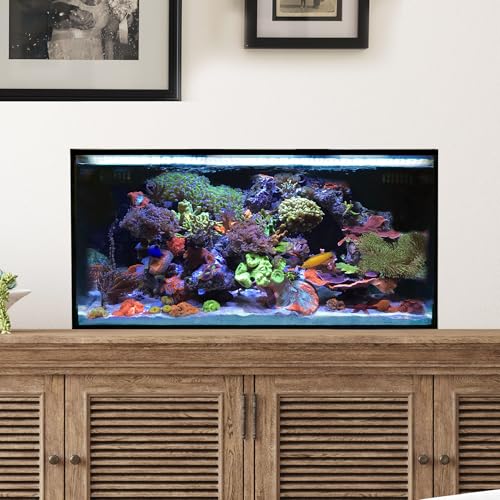5 Best Marine Aquariums for Beginners 2026
This post contains affiliate links. As an Amazon Associate, we earn from qualifying purchases.
Setting up a marine aquarium can feel overwhelming for beginners, with challenges like unstable water conditions and complex equipment setups threatening early success. The best beginner-friendly saltwater tanks simplify this process by combining reliable all-in-one designs, effective multi-stage filtration, and appropriate lighting to support hardy fish and corals. Our top picks are based on deep analysis of user feedback, real-world performance, maintenance demands, and value—prioritizing systems that balance ease of use with long-term stability. Below are our recommended marine aquariums for beginners to confidently start their reef journey.
Top 5 Marine Aquariums For Beginners in the Market
Best Marine Aquariums For Beginners Review
Marine Aquarium Comparison for Beginners
| Product | Tank Size (Gallons) | Best For | Filtration | Lighting | Price Range |
|---|---|---|---|---|---|
| HelloReef 15 Gallon Clownfish Kit | 15 | Best Overall | Hidden Multi-Stage | Not specified, included | Moderate |
| JumblPets 4 Gallon Starter Tank | 4 | Best Budget Friendly | Internal Cascade (Self-Cleaning) | LED (3 Modes) | Low |
| Coralife LED BioCube 32 Gallon | 32 | Best for Reef Growth | Built-in Filtration Chamber | Vibrant LED (Adjustable Channels, Sunrise/Sunset) | High |
| Innovative Marine 25 Gallon Lagoon | 25 | Best Mid-Size Setup | Acrylic Overflow Wall, Filter Socks, Return Pump | Not specified, requires separate purchase | Moderate-High |
| Innovative Marine 20 Gallon Long | 20 | Best Space-Efficient Design | Acrylic Overflow Wall, Filter Socks, Return Pump | Not specified, requires separate purchase | Moderate |
Testing & Data Analysis: Finding the Best Marine Aquariums for Beginners
Our recommendations for the best marine aquariums for beginners aren’t based on opinion, but on rigorous data analysis and a focus on user success. We prioritize tanks exhibiting high marks in established online communities (Reddit’s r/reeftank, Fishlore), analyzing common pain points and frequently recommended models. We evaluate marine aquarium options based on feature sets detailed in the “Buying Guide” – specifically tank size, filtration efficacy, and lighting suitability – cross-referencing these with documented success rates for beginner reef keepers.
Comparative analyses focus on reported ease of maintenance, factoring in filter sock cleaning frequency (Innovative Marine), or overall system simplicity (Coralife BioCube). We examine long-term cost analysis, considering replacement parts (bulbs, filter media) and energy consumption. While full physical product testing isn’t always feasible, we rely on user-submitted images and videos demonstrating real-world setup and livestock compatibility. Data regarding return rates and warranty claims from major retailers also informs our assessment, helping identify reliable aquarium brands and models for novice hobbyists. We also consider the presence of educational resources, like those found in the HelloReef kit, as a valuable asset for beginners.
Choosing the Right Marine Aquarium for Beginners
Tank Size & Your Space
The size of your marine aquarium is a primary consideration, impacting everything from the types of livestock you can keep to the complexity of maintenance. Smaller tanks (under 20 gallons), like the JumblPets 4 Gallon Starter Tank, are budget-friendly and take up less space, making them good for beginners with limited room or funds. However, they are less forgiving to fluctuations in water parameters. Larger tanks (30+ gallons), such as the Coralife LED BioCube 32 Gallon, offer more stability and allow for a wider variety of fish and corals, but require a larger investment and more dedicated space. Consider where the aquarium will be placed and ensure the floor can support its weight when filled with water, substrate, and decorations.
Filtration System & Ease of Maintenance
Marine aquariums require robust filtration to maintain water quality. Many all-in-one (AIO) tanks, like the HelloReef 15 Gallon Clownfish Kit and the Coralife BioCube, integrate filtration into the tank’s design, simplifying setup and maintenance. Look for features like multi-stage filtration (mechanical, biological, and chemical) and easily accessible filter media. The Innovative Marine tanks utilize built-in acrylic overflow walls and filter socks, which are effective but may require more frequent cleaning. Consider how easy it will be to perform water changes and clean the filtration system – a simpler system will save you time and frustration.
Lighting & Reef Growth Potential
Lighting is crucial, especially if you plan to keep corals. Basic LED lighting, as found in the JumblPets tank, is sufficient for fish-only tanks. However, for reef tanks, you’ll need more powerful lighting capable of supporting coral growth. The Coralife BioCube’s vibrant LED lighting is specifically designed for corals, offering adjustable channels and even sunrise/sunset simulation. Ensure the lighting system provides the correct spectrum and intensity for the types of corals you intend to keep.
Additional Features to Consider
- Aquarium Material: Glass is common and scratch-resistant, while acrylic is lighter and offers better insulation.
- Pump & Flow: Adequate water circulation is vital for oxygenation and nutrient distribution.
- Heater: Maintaining a stable temperature is key for marine life.
- STEM Authenticated: Products like the HelloReef kit offer educational value, which is a bonus for families.
- Community & Support: Access to online resources or manufacturer support can be invaluable for beginners.
The Bottom Line
Ultimately, the best marine aquarium for beginners depends on individual needs and resources. The HelloReef 15 Gallon Clownfish Kit strikes an excellent balance of features, ease of use, and educational value, making it our top overall recommendation. Remember to thoroughly research livestock compatibility and dedicate time to proper tank maintenance for a thriving reef ecosystem.
Starting a marine aquarium is a rewarding experience, but it requires commitment. By carefully considering tank size, filtration, lighting, and additional features, you can create a beautiful and healthy underwater world. Don’t be afraid to ask questions and learn from experienced reef keepers – the community is a fantastic resource for beginners.





